Community-led Total Sanitation (CLTS) emerged as a radical approach in early 2000, shifting the focus from provision of direct subsidies for toilet construction to facilitation of collective behaviour change to end open defecation globally. After its introduction in the Eastern and Southern region of Africa in the year 2007, it was initiated in the Western and Central region, in Sierra Leone. Dr. Kamal Kar introduced CLTS in Sierra Leone in late 2007 and in Liberia in 2008.
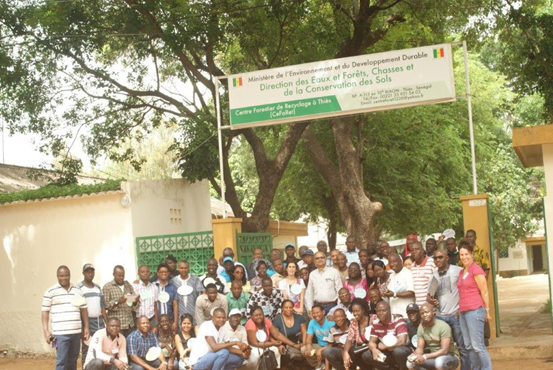
Group Photograph of CLTS Practitioners and Policy Makers in Thies, Senegal
It was a major advocacy and training workshop organised in Bamako in Mali later, in which leaders from 23 countries in the region participated, that provided the necessary impetus for mainstreaming CLTS in the region. Following this, CLTS pilot projects were introduced in most of the countries in the region and was subsequently adopted as the core strategy for enhancing sanitation progress during the Millennium Development Goals (MDG) period. This is the second follow up intervention of CLTS Foundation for this region after Bamako 2009 CLTS workshop. In between intensive efforts were given in many Francophone and Anglophone countries by Community Led Total Sanitation Foundation. A recent regional workshop organised in Dakar with participation from 18 countries can be seen as a similar milestone to boost sanitation efforts during the Sustainable Development Goals (SDG) period.
Experience of CLTS in Western and Central Africa Region (WCAR):
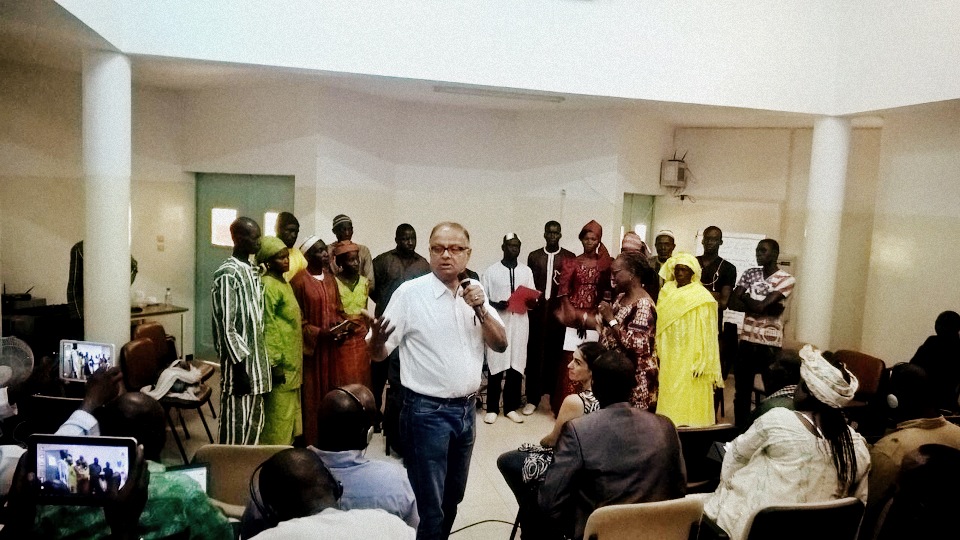
Simulation exercise by Dr. Kamal Kar in progress at Thies, Senegal.
In the last decade, majority of countries in WCAR decided to adopt CLTS as the recommended methodology for rural sanitation programming. The early adopters of the approach were Sierra Leone, Mali, Ghana and Nigeria. Subsequently, other countries such as Benin, Cote d’ ivoire, Cameroon, Chad, Congo Brazzaville, Gambia, Guinea, Guinea Bissau, Liberia, Mauritania, Niger, Nigeria, Senegal and Togo followed suit. At the end of 2010, it was estimated that more than one million people were living in open defecation free environments as a result of the CLTS interventions. As the momentum to achieve results picked up towards the end of the MDG period, it is certain that the ODF achievement in these countries would have increased at the end of the year 2015.
However, huge challenges persist for the región during the SDGs. While individual countries might have made progress, the rate of open defecation (OD) has increased on the whole. At the end of the MDG period, the rural OD rate in WCAR stands at 38%. Countries like Burkina Faso and Democratic Republic of Congo are yet to do away with a subsidy policy entirely and lag far behind its counterparts in the region. More than half of the population in Benin, Burkina Faso, Chad, Niger, Sao Tome and Principe and Togo defecate in the open. The rate of OD in Cote d’Ivoire, Mauritania and Nigeria is equally high between 25% and 50%. Nigeria is ranked 4th in the world for number of people practicing open defecation, which is as much as 45 million people.

While the rolling out of CLTS in the countries in the region produced impressive results during the last decade, scaling up of these interventions nation-wide has remained a challenge. This has been primarily due to the lack of an enabling environment and persistence of institutional bottlenecks that have prevented capacity building and change in mindsets at different levels, mobilisation of the necessary government and external funds, and mechanisms for actor coordination; all of which are critical in achieving CLTS outcomes. Going forward, what is required in the SDG period are context specific strategies to scale up CLTS in each of the target countries in the WCAR. While some countries require immediate capacity strengthening and process support at different levels, some others need advocacy support to influence their national policy to create an enabling environment for CLTS implementation and scale up. In most cases, for effective CLTS implementation, it is critical to establish functional linkages among key actors, develop an engagement strategy among different levels of government functioning and capture outcome and impact through locally evolved monitoring and verification mechanisms.
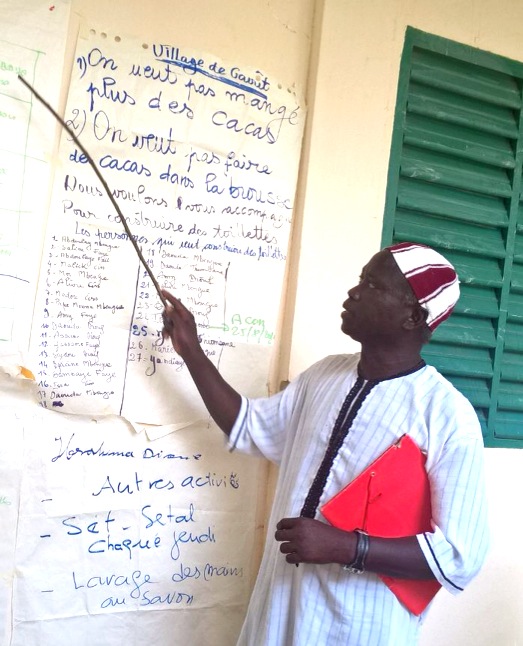
A community member presenting in the workshop
Towards achieving this objective, CLTS Foundation will support the Western and Central Africa Region to accelerate and improve sanitation and hygiene behaviour practice through elimination of open defecation, in partnership with UNICEF WCAR Office. Following the landmark regional workshop in Mali in the year 2007, this will the second stage of CLTS Foundation’s institutional support to the region, which will involve policy advocacy to build an enabling environment for CLTS, enhancing capacity to implement and scale up CLTS; assessing the status of CLTS programming in countries already implementing CLTS through an innovative methodology; and improve regional learning and exchange via capacity building, documentation and learning events.
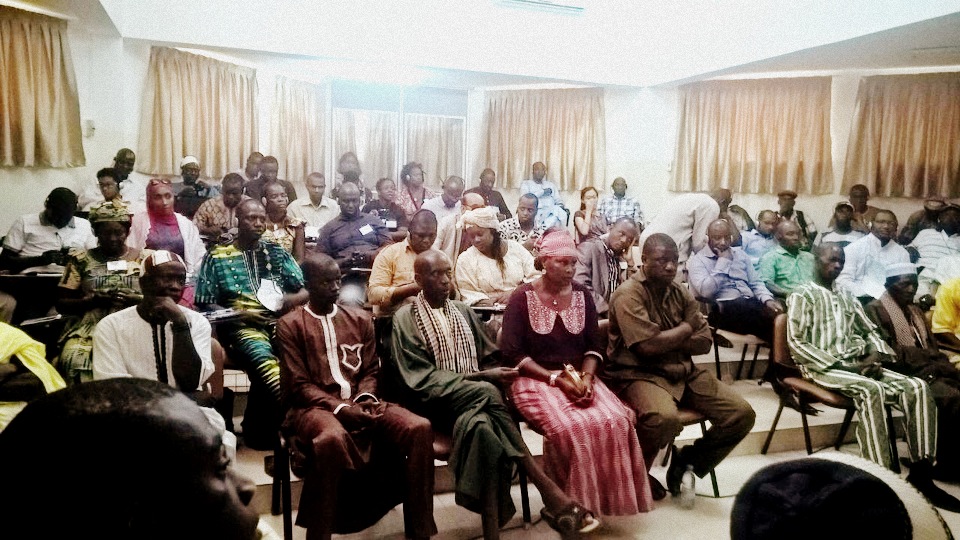
Regional Workshop with CLTS Practitioners and Policy Makers in progress at Thies, Senegal
To kickstart this initiative, a regional workshop bringing together participants from 18 countries in the region, was organised recently in Dakar in Senegal. The objective of the workshop was to enhance capacities for scaling up through appropriate policy and coordination mechanisms that bring all formal and informal actors ( like Natural leaders and local actors) into the fold. As part of the regional planning to meet the sanitation milestones set out in the SDGs, the aim of the workshop was to establish a pool of trained individuals and organisations within WCAR who would not only contribute to capacity building nationally at various levels but would also support the organisation of trainings in other countries in the region.
This 7 days’ regional training workshop took place in Dakar and Thies in Senegal from August 22nd to 28th, 2016 and involved participants from the following countries: Senegal, Benin, Cameroun, Liberia, Sierra Leone, Cote d’ivoire, Mali, Mauritania, Burkina Faso, Congo, Chad, Djibouti, Guinea-Bissau, Guinea Conakry, Madagascar, Ghana and Burundi. The participants were directors and senior officers from different ministries (mainly Ministry of Health, Ministry of Water and Sanitation, Ministry of Environment), deputy heads of NGOs and UNICEF WASH teams from different countries in the region. The workshop included discussions and deliberations in Dakar on key topics related to CLTS scaling up, followed by a hands-on field training experience. Eight communities were triggered in the villages of Thies, as part of this workshop. The last two days of the workshop focused exclusively on essential elements of post triggering follow up and post ODF activities addressing the elements of sustainability, effective monitoring mechanisms and scaling up with quality to produce ODF districts/ regions etc. Each country team met in small groups to brainstorm on and develop action plans focusing on streamlining the national sanitation policy to ensure an enabling environment for CLTS, developing an appropriate scaling up strategy involving all conventional and non-conventional actors such as Natural leaders and Community Consultants, and building national capacity and mechanisms for sharing and disseminating experiences and best practices.

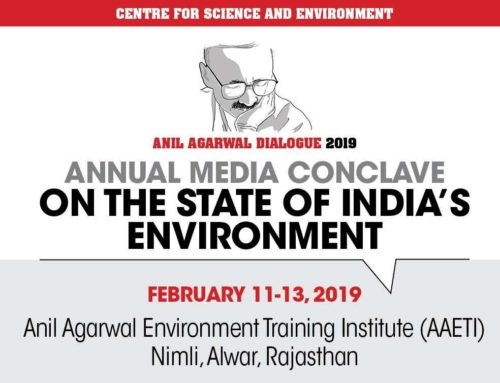
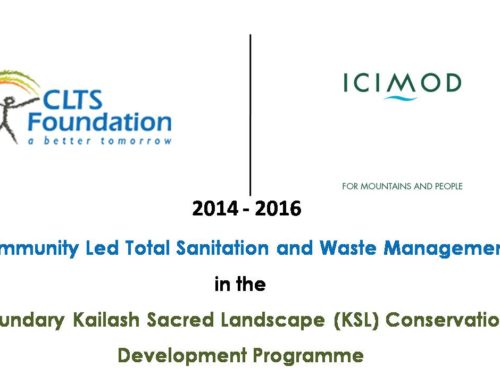
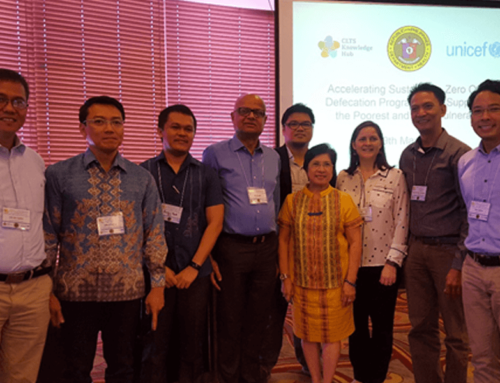
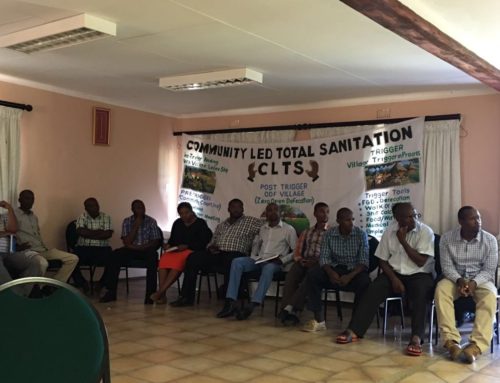
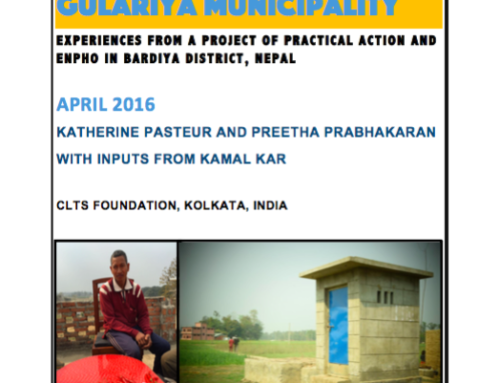
Leave A Comment